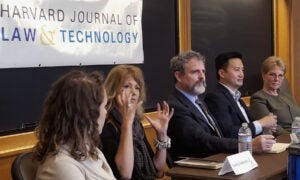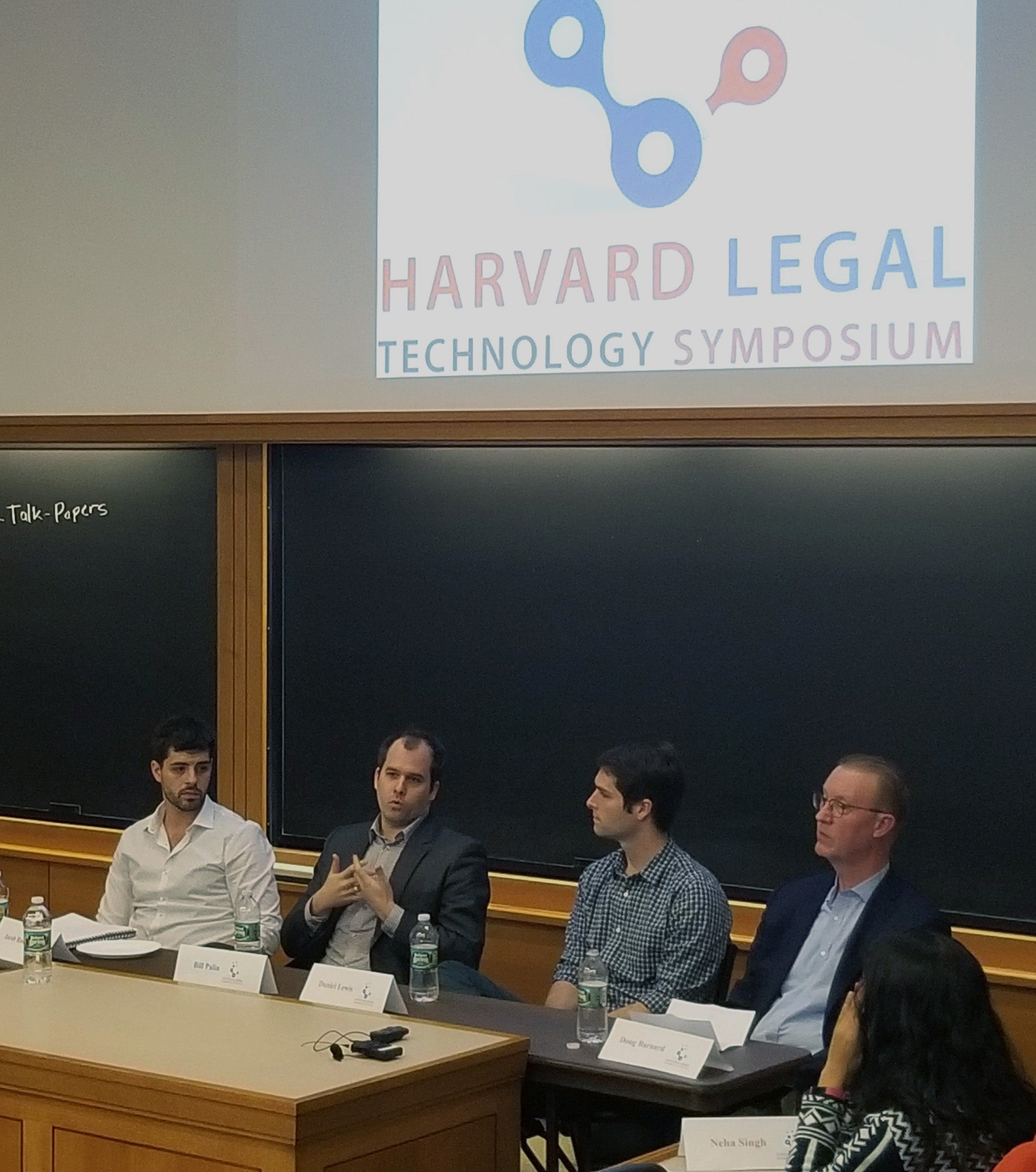In November, practitioners, technologists and innovators from across the legal spectrum came together for a series of discussions on the impact of ever-changing modern technologies on today’s practice of law.
The 2018 Harvard Legal Technology Symposium, held Nov. 5 to Nov. 9, was hosted by the Harvard Association of Law and Business, in collaboration with the Center on the Legal Profession, the Library Innovation Lab, the Journal of Law and Technology, the Harvard Law Entrepreneurship Project and the Harvard Law and Technology Society. Panel discussions throughout the week-long event focused on trends, opportunities, and challenges to look out for in the future.

On Nov. 5, the symposium kicked off with a discussion on “Technology in Law Firms,” hosted by the Journal of Law and Technology. Panelists included Laurie Chamberlin, president at Special Counsel, David Wang, corporate strategic innovation counsel at Wilson Sonsini, Jonathan Rudolph, director of professional services at Actiance and Gail Bergmiller, director of knowledge management and library services at Ropes and Gray.
Harvard Law School Professor David Wilkins ’80 moderated a Nov. 6 panel discussion on “The Next Generation Lawyer,” with panelists Peggy L. Giunta, chief legal personnel and development officer and chief practice management officer at WilmerHale, M. Alejandra Parra-Orlandoni ’15, associate general counsel at Quantum Black, and Steve Fleming, chief technology officer at Opus 2 International.
Wilkins, who serves as director at Harvard Law School’s Center on the Legal Profession, said talk about disruption and innovation in the legal profession, while important, has been both over and under-inclusive. Globalization and the rise of information technology are impacting all professions, he said, not just the legal profession. But, he added, the rule of law implies continuity. The challenge, he said, is trying to understand how forces of both continuity and change will affect the legal profession. To do that, he argues, “you have to have some idea about not just how to talk about innovation or how to think about it, but how to operationalize it.”
On Nov. 7, two Harvard Law School 3Ls who helped build a startup company, Evisort, that uses artificial intelligence-enhanced document management and data analytics solutions for contracts, headlined a panel on “Using AI and Data in Contracts.” MbaMemme Onwudiwe ’19, executive vice president at Evisort, and Riley Hawkins ’19, product manager at Evisort, discussed their start-up, which was co-founded by Evisort CEO Jerry Ting ’18 and Evisort COO Jacob Sussman ’18. Ting came up with the idea as an undergraduate and worked with Harvard Law students and MIT researchers to develop the company while studying at HLS. (See: “HLS students harness artificial intelligence to revolutionize how lawyers draft and manage contracts.“) As part of the panel, Onwudiwe and Hawkins discussed a 2018 Columbia Business School Case Study, Evisort: An A.I.-Powered Start-up Uses Text Mining to Become Google for Contracts, published by Columbia Business School data scientist Professor Daniel Guetta, director of the Business Analytics Initiative at Columbia Business School and Columbia Engineering. On Nov. 29, Guetta began teaching the Evisort case study in a new Business Analytics MBA class. The case study will be joined by a technical case study counterpart in the near future.
Ting discussed the technology Evisort brings to legal departments as part of a panel discussion, organized by the Harvard Law and Entrepreneurship Project, on “Technology in Legal Departments.” Panelists included Jim Cobery, general counsel of the New England Patriots; Paul James, senior vice president, Risk Management & General Counsel at BondBrothers; Brad Gordon, senior vice president, general counsel and secretary at Gilbane Building Company, and Bill Tsingos ’96, general counsel at Toptal.
The symposium wrapped up with a discussion of “Natural Language Processing Technology and Law.” Organized by the Library Innovation Lab and the Harvard Law and Technology Society, the panel featured Daniel Lewis, co-founder and CEO of Ravel Law; Jacob Rosen, co-founder and chief technology officer of Legit.ai; Bill Palin, Access to Justice/technology fellow at Harvard Law School; and Doug Barnard, senior vice president and general counsel at CF Industries.
